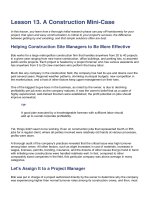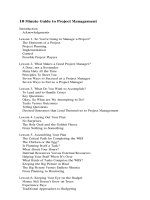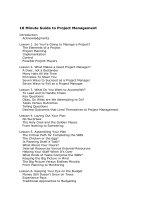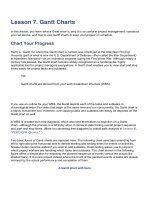management alpha 10 Minute Guide to Project Management PHẦN 9 docx
Bạn đang xem bản rút gọn của tài liệu. Xem và tải ngay bản đầy đủ của tài liệu tại đây (34.73 KB, 13 trang )
PlanView
PlanView provides all-browser software within a Windows environment for managers, employees,
and others throughout the enterprise—as well as partners, vendors, and service providers in the
extended enterprise. The software helps manage projects and other work, update employee
information, and manage the workforce. PlanView optimizes the staffing of multiple projects by
taking into account the skills and true availability of your workforce. Thus, PlanView enables an
enterprise to measure all work and to manage to its full capacity.
PlanView is delivered by user role. That could be managers, employees, and others throughout
the enterprise—as well as partners, vendors, and service providers. PlanView Online is an
integrated project and workforce management system, is 100 percent Web software, and features
● Personalized Web portal
● Self-administration by staff
● Collaborative critical path engine
● Support for your project office
● Viewing workforce capacity
● Integrated time and expense tracking
● Project delivery model
PlanView uses an enterprise Web portal to manage workplace access to information and
applications. The enterprise portal is the workers' interface to the PlanView intranet or extranet.
The features available to each role are tailored for each customer.
Managers, employees, and business partners sign on to PlanView through a dynamically built
Web page called HomeView. Each person's HomeView portal reflects his rights to the information
in the central repository and the unique needs of his role in the enterprise.
When the user signs on to the system, his or her profile is recalled, and a unique set of features is
placed on the menu for his or her use. PlanView calls these FeatureSets, and they provide access
to the rest of the functions of the PlanView suite. For instance, a project manager has access to
her project portfolio, the scheduling engines, and approval of status information. A contributor will
report time, expenses, and remaining work and update his skills.
Users' favorite Web links for discussion groups, project or department Web sites, as well as
executables for key software like a virtual meeting software, project sites, and methodology
content providers are all easily accessed.
TIP
Reminders let users track events with knowledge of current time, to inform them
when events are due.
Dekker
Dekker TRAKKER project management software offers many en-hanced features, such as
enhanced integration with Oracle and SQL Server for complete enterprise control and enhanced
human interface to simplify data entry through spreadsheet views. The software also does the
following:
● Provides the ability to utilize Microsoft Access for Work-group and offline data
requirements.
● Increases system performance.
● Provides user-defined three-dimensional bar charts.
● Provides configurable milestone and bar colors.
● Enables enhanced curve loading.
● Yields real-time calculation.
● Offers ABC and Gantt view screens.
The Gantt view screen, for example, offers selectable three-dimensional activity bars, user-defined
bar style, customizable colors, configurable columns, integrated baseline control, interim
milestones on a single line, user-defined milestone symbols, fiscal and standard time scale, and
real-time calculation.
The ABC View Screen offers selectable data row, values in heads, quantity dollars, burdens,
configurable columns, the new Trakker spreadsheet view for familiar data entry, integrated
baseline control, real-time calculation, and complete cost and schedule integration.
Primavera
Primavera SureTrak Project Manager recognizes a project team's need for constant, timely project
communications and updates. Primavera bolstered its SureTrak with Web publishing
enhancements that let users quickly and easily save project layouts and reports in HTML format.
The Web Publishing Wizard can then group and sort the tabular and graphical HTML reports and
layouts from all your projects, into a single, easy-to-read project Web site that can be conveniently
viewed by the whole team.
Based on extensive usability testing, SureTrak simplifies project management for mainstream use
by addressing the ease-of-use needs of novice project managers, while delivering project
management applications for small-to-medium–sized projects. Its rich feature offering includes
advanced organization of project plans, activities, and team members; Project KickStart for step-by-
step project plan creation; Progress Spotlight for easy updating of project activities and Web
Publishing Wizard for enhanced online communications among team members.
The Variable Timescale feature lets users zoom in on a portion of the project time scale. For
example, activities scheduled for the next month can be displayed in days, while the rest of the
project is displayed in weeks or months. This feature presents the details for one period of interest,
while still displaying the entire project on one page.
To give project teams greater insight into the sequence of interrelated project tasks, SureTrak 3.0
includes an intuitive PERT Timescale display.
SureTrak builds on existing customization capabilities, by enabling users to modify an individual or
group of bars based on activity attributes. By combining new display options with colors and
patterns, project managers will be able to graphically communicate valuable project details and
status for analysis.
SureTrak includes several other new capabilities, designed specifically to simplify use of the
software. In addition to an updated user interface that adheres to accepted 32-bit operating
environments, users will find they are more productive when analyzing alternative what-if
scenarios for their projects, by taking advantage of new options for using project filters and display
layouts.
Other Primavera Products
With P3e you can manage the entire project lifecycle. P3e is a total project management solution,
encompassing all aspects of the project lifecycle. It combines all of the in-depth project
management capabilities required by project-driven managers.
Through costs, schedule, and earned value thresholds, or variances, P3e automatically generates
issues when thresholds are exceeded by project elements. Project managers can prioritize
resulting issues and let P3e send e-mail alerts to the responsible parties to ensure prompt
resolution. To make sure that project risks are properly identified and quantified, P3e also
integrates risk management and assesses the impact of those risks. P3e quickly performs what-if
simulation to determine the schedule and cost exposure of project risks based on estimated
impacts and probability factors.
TIP
Risks can be categorized and risk control plans can be documented as part of the
overall project plan.
Prima Progress Reporter provides full workgroup support and coordination of project resources
with minimum training and hassle. Each team member receives activity assignments—even
across multiple projects. Team members use Progress Reporter to communicate timesheet and
activity status to the project manager and project database via the LAN, remotely via e-mail, and
over the Internet.
Primavera Portfolio Analyst provides unparalleled project summary and tracking information to
executives, senior managers, and project analysts through a rich set of graphics, spreadsheets,
and reports. The Project Portfolio wizard groups together any number of projects, based on project
attributes or hierarchy, for comparison and analysis. Portfolio Analyst's interactive interface allows
quick drill-down to see information at any level of detail for clear presentation and discussion.
P3e combined with Portfolio Analyst and Progress Reporter form the most advanced solution for
managing all projects within an enterprise.
Welcom
Welcom offers "Project Management for a Changing World." Welcom is a global distribution of
project management software, providing leading tools to corporations worldwide. The Welcom
product line includes totally integrated and versatile software for managing both in-house and
enterprise-wide projects.
Welcom has joined Pacific Edge Software to define the XML (Extensible Markup Language)
schema for project management.
TIP
The flexible business-to-business schema will enable intelligent project data
exchange between an organization's information systems.
Microsoft
The best way to manage your projects is to have the information you need right in front of you.
Microsoft Project 2000 gives you that information by providing flexible tools for organizing, viewing
and analyzing project data and by allowing your team members to update their status through the
Web—another way of making The Business Inter-net work for you.
Since the most accurate status information comes from those doing the work, Microsoft Project
2000 includes a simple, Windows-based interface that team members can access from their Web
browsers to provide collaborative input. It's called Microsoft Project Central, and it can give you up-
to-the-minute data that will help you to make the best decisions for your business.
Project KickStart
Project KickStart is a powerful, but easy-to-use planning tool that helps you design, organize, and
schedule any project. Project Kick-Start's eight-step planning process focuses your attention on
the structure of the project, the goals, resources, risks, and strategic issues critical to your project's
success. Your plan is ready in 30 minutes.
Schedule your project using the pop-up calendar and Gantt chart. Print out a to-do list or one of
the seven presentation-ready reports. Or, for added versatility "hot link" your plan into Microsoft
Project, SureTrak, P3, FastTrack Schedule, Super Project, Project Scheduler 7, Time Line,
Milestones Etc., WBS Chart, Word, WordPerfect, and Excel.
Some of the features and benefits include
● The ability to work with any size project up to 750 tasks and 75 resources.
● Sample projects packed with information, and ready to use.
● Drag-and-drop hints from libraries of goals, phases, and obstacles.
● Gantt chart for "big picture" scheduling.
● Seven presentation-ready reports.
● Saving as HTML—post project plans on your Intranet.
● Hot-link to Word, WordPerfect and Excel—include project plans in proposals and business
plans.
● Hot-link to other PM software.
● Free technical support.
Project KickStart requires no project management training to use and comes with a helpful (and
knowledgeable) "advisor" and free, friendly telephone support.
TIP
By working through the program's icons and organizing your project step by step,
you'll develop a clear overview of the project and what it will take to complete it.
You become totally in control—more efficient, more effective, more successful.
The next time your boss asks for a project plan or your staff demands a marketing strategy, just
click on Project KickStart. This breakthrough program will help you design, organize, and schedule
your project in only 30 minutes.
● It's fast and easy—no training required. Your plan is ready in minutes!
● Plan with complete confidence. With Project KickStart, nothing is overlooked. Nothing is
forgotten.
● Schedule the way you want. It is your choice. Use Project KickStart's built-in Gantt chart for
small to mid-size projects. Or hot-link data to Microsoft Project and other software for
added functionality.
The 30-Second Recap
● PM software changes so rapidly that no book is published fast enough to review the latest
software.
● The more training a project manager has with a particular type of PM software, the more
highly he or she tends to rate that software. Hence, training is important!
● Many vendors now offer total online project management capabilities.
● Many vendors offer software support, and with the complexity of the programs they sell,
support is crucial.
Lesson 12. Multiple Bosses, Multiple
Projects, Multiple Headaches
In this lesson, you learn how to keep your wits on multiple projects, help your bosses not to
overload you, handle multiple reporting structures, and be assertive when overload seems
unavoidable.
Participating on More Than One Project at a Time
Sometimes you're asked to manage this and asked to manage that. Managing more than one
project at a time is more difficult than managing a single project, but it is not impossible. People do
it all the time, and with a few observations and insights, you can get good at it as well.
Sometimes organizations assign smaller projects to up-and-coming managers, such as you, as a
form of on-the-job training. By letting you get your feet wet on small fleeting projects, you are
better prepared to tackle larger ones. Some companies also assign newly hired staff to serve as
project team members on small projects so that they will have a wider view of company operations
and, in time, manage some of the smaller projects themselves on their path to leading larger
projects.
As you will see in Lesson 14, "Learning from Your Experience," all the skills that you acquire
and all the insights and experience you gain represent grist for the mill.
TIP
When managed properly, small projects (even one-person projects) still contain
some of the essential elements found in the largest of projects.
By its nature, project management is a short-term, challenging endeavor. The opportunity to tackle
small projects and even a series of small projects simultaneously is a worthwhile career challenge.
As you hone your planning, monitoring, and overall organizational skills, you become a far more
valuable employee to your organization. After all, they have had other projects in the past in which
managers failed to achieve the desired outcome, budgets were overrun, time frames were missed
by a mile, morale dropped to zero, and chaos ruled.
TIP
Reframe your focus about participating in or even managing multiple projects as
opportunities worth mastering.
Complexity Happens
Suppose you're not formally assigned the task of managing two projects at once or having two
projects overlap in terms of time interval. Chances are that you still face general issues related to
managing multiple priorities. If so, you are not alone. An increasing number of career professionals
seem to be affected by this same phenomenon.
Why is it that things seem to be getting more complex? The increase in both size and usage of the
Internet means that information is disseminated at much greater speeds and volumes than at any
time before. Information is power, as you've rapidly learned, and people use it to market or sell
goods, construct new organizations, or create new ways to get a jump on the competitor.
In addition, the increasing use of technology in our society ensures that you will have more to
contend with. In North America today, we face a major technological breakthrough every 17
minutes. This is as much as 3 or 4 an hour, 70 to 80 a day, and thousands per year. We will soon
be in an environment where there are 17 technological breakthroughs every minute, with hundreds
of associated services.
Perhaps most onerous for the project manager, as we proceed into the future and society
becomes more complex, more stringent documentation is often required by the government,
customers, and others. No project goes unscathed. It's unfortunate, but it seems it's getting harder
and harder to do anything without documentation. Hiring or firing someone, buying a product,
selling something, expanding, merging, casting off—almost any business function you can name
requires more documentation, which contributes to each of us having to handle an increasing
amount of work.
A Diffuse Pattern
In many organizations, you may encounter scores and scores of small-to-medium–sized projects
with various starting and stopping times throughout the year. Often, some of these projects are not
large enough or complicated enough to require the services of a full-time project manager. In such
cases, somebody may be asked to manage a project while still maintaining much of the
responsibility for their principle role in some other department or elsewhere in the organization.
Such project managers may also find themselves in charge of several small projects whose time-
frames overlap by varying degrees. If you're put in charge of a variety of small projects, you need
to mentally separate them and to stay focused on each.
A Tale of Two Offices
My friend and fellow speaker, Al Walker from Columbia, South Carolina, managed two projects a
few years ago with aplomb. As a professional speaker, Al had the continuing task of preparing for
his roster of scheduled speeches coming up. In such cases, he had to ensure that flights were
made, project materials delivered to the meeting planner in plenty of time, all hotel
accommodations were made and so on. On top of that, he was elected to the presidency of the
National Speakers Association, a post that lasted one fiscal year.
TIP
Managing multiple projects may be less of a burden than you anticipate. After all,
in your own career, whether you can call them projects or not, you probably have
already perfected techniques for handling a variety of simultaneous issues or
priority items.
Al took on the responsibility admirably. He knew that more than 3200 members of the organization
were counting on him for effective leadership. To establish a separate focus, Al rearranged his
corporate offices so that he had a distinct and separate office for his speaking business and for his
role as NSA president.
As he walked from one office to another, his focus and attention shifted dramatically in seconds.
He even had different phone lines installed and duplicate supporting equipment so that he did not
have to shuttle items back and forth between the offices.
TIP
The key to managing multiple projects is to maintain a clear and separate focus so
that when you are working on Project 1, Project 1 is the only thing in your mind,
and likewise when you are working on Project 2.
Extravagance is Not Necessary
Al's approach may sound extravagant. After all, you have to have both the space to set up an
additional office and the resources to stock both offices adequately for the projects at hand. Yet,
most people can do something nearly the same. Who doesn't have doubles on certain types of
office equipment? Nearly everyone has the room to carve out additional space, perhaps not in a
physically distinct office or cubicle. Yet, somewhere else with your office, or organization, home,
vacation home, or other physical space you have.
Start up procedures and the associated burdens for creating a second office or work area are
more than offset by the mental clarity and emotional resilience you engender. Once you're able to
maintain the two work areas, managing two projects becomes more viable.
CAUTION
Does this mean that if you are managing three projects it would be advisable to
create a third office? Not necessarily. You can carry this concept too far.
When faced with two major projects of fairly equal weight and complexity the "two office spaces"
approach works as well as any.
Reporting to More Than One Boss at a Time
Related to the issue of managing multiple projects is having to deal with multiple bosses—either
on one project or on several projects. The immediate recognizable challenge is that either boss is
likely to encroach on the schedule you have already devised in pursuit of the assignments doled
out by the other boss.
Understandably, you may experience a range of anxieties and concerns when having to relay to
one boss that plans may have to be delayed because of other activities you are involved with.
Relations with all bosses in the case of a multiple boss situation need to be handled delicately.
After all, depending on your organization, bosses may
● Have the power to fire you on a moment's notice without consulting anyone else.
● Conduct performance appraisals of you that dramatically impact your ability to advance in
the company.
● Define your job responsibilities. Indeed, they personally may have written your job
description.
● Schedule your work activities. In this respect, your boss may have control over each and
every hour that you spend at work, what you work on, how quickly you have to work, and
what resources you're provided.
● Have leverage over what benefits you receive.
You may find yourself having to become professionally assertive with your various bosses. Stay
open and candid with them so that you don't end up promising everything to everybody and
thereby creating incredible pressure on yourself! Here are some suggestions for dealing with each
of your multiple bosses:
● Praise your bosses when they merit praise. Many employees forget that the boss is a
person, too, and one who needs psychological strokes just like everyone else.
● Assemble your evidence. If you have a point to make, come in armed with supporting
artifacts.
● Don't dump on your boss. Your boss is not a shoulder to cry on for what went wrong at
home or on the project.
● Pace your communications. Don't overwhelm your boss with more than he or she can
comfortably ingest. Your project may be only one of many.
● Take personal responsibility for any departmentwide activities or projects in which you're
participating.
● Don't drone on. Present your situation or problem as succinctly as you can, while
maintaining an effective level of interpersonal communication.
Workaholic For Hire
What about the situation where you are flat out asked to do too much, take on too much work, stay
too many hours or handle more than you're comfortable handling? In such cases, the ability to
assert yourself becomes a valuable one. Suppose you work for a boss who's a borderline
workaholic. No, make that a full-fledged workaholic. How do you keep your job, turn in a good
performance, maintain sufficient relations, and still have a life? As I pointed out in The Complete
Idiot's Guide Assertiveness, you say no without making it sound like no:
● "That is something I'd really like to tackle, but I don't think it would be in our best interest
since I'm already on XYZ."
● "I can certainly get started on it, but because of the DEF deadline and the XYZ event, I'm
certain I won't be able to get into it full swing until the middle of next month."
● "If we can park that one for a while, I'm sure I can do a good job on it. As you know, I'm
already handling the HIJ and wouldn't want to proceed unless I could do a bang-up job. If
you're eager to have somebody get started on this right away, I wouldn't hesitate to
suggest Tom."
● "Hmmm, help me here; I'm not sure what level priority this should be in light of the lineup
I'm already facing …."
Don't Wimp Out on Yourself
Too many professionals today, fearful that they may lose their job as well as their health and other
benefits, suffer various forms of work-related abuse because they lack the ability to assert
themselves.
The following is some additional language, mildly more forceful, that you may need to draw upon
depending on circumstances:
● "I'm stretched out right now on Project A to the full extent of my resources, and if I take this
on, not only will I not be able to give it my best effort, but the other things I'm handling will
suffer as well."
● "I'm going to request that I not be put on Project D, if that's okay with you. I've been going
long and hard for several months now, and if I don't regain some sense of personal
balance I feel I'm putting health at risk."
● "Is there anyone else right now who could take on that project? I need to get a better
handle on what I'm already managing."
● "I wish I could—I've been burning the candle at both ends on Project A, and if I start to
burn it in the middle, there will be nothing left."
Asserting Yourself in Dire Situations
Suppose despite your protestations to the contrary, your boss or bosses keep piling on the work
and responsibilities. No matter how effective you are at asserting yourself and how often you do it,
you seem to be besieged with more assignments and more projects. Here are the basic options:
● You can push for a compromise situation where you take on some of the new work. Or,
you can take all of it on, but you'll have to receive additional project resources, such as
more people, bigger budget, or more equipment.
● You can knuckle under and simply take on the added assignments with no additional
resources. (Avoid this!)
Instead, compute how many staff hours will be necessary to tackle the added assignment, how
much that would cost, and what the overall return would be. Likewise, if you need a bigger budget
in general, new equipment, or other project resources, figure it out and ask for it!
The 30-Second Recap
● Constant advances in technology make us constant multi-taskers. This is a valuable and
marketable skill. Managing more than one project at a time is achievable if you can
successfully separate your responsibilities—mentally and maybe even physically.
● Remember that your bosses are human, too—and at least as busy as you are. Respect
their time by being concise and organized in your communications, but don't hesitate to
issue kudos and praise when they are due.
● Sometimes, you have to assert your own rights, as a person with a life, and you have to be
assertive in declining additional responsibilities or requesting more support.
● When you still are asked to take on more than you can comfortably handle, don't hesitate
to ask for a compromise, or additional resources, or both.
Lesson 13. A Construction Mini-Case
In this lesson, you learn how a thorough initial research phase can pay off handsomely for your
project, that open and easy communication is critical to your project's success, the difference
between getting by and excelling, and that simple solutions often are best.
Helping Construction Site Managers to Be More Effective
Bob works for a large metropolitan construction firm that handles anywhere from 20 to 40 projects
in a given year ranging from new home construction, office buildings, and parking lots, to assorted
public works projects. Each project is headed by a project foreman who has various assistants and
has anywhere from 5 to 25 crew members who perform the heavy labor.
Much like any company in the construction field, the company has had its ups and downs over the
past several years. Regional weather patterns, shrinking municipal budgets, new competition in
the market place, and a host of other factors keep upper management on their toes.
One of the biggest bug-a-boos in the business, as noted by the owner, is due to declining
profitability per job even as the company matures. It was the owner's belief that as a cadre of
highly experienced, well-trained foremen were established, the profit potential on jobs should
improve somewhat.
TIP
A good plan executed by a knowledgeable foreman with sufficient labor should
add up to overall corporate profitability.
Yet, things didn't seem to be working. Even on construction jobs that represented fourth or fifth
jobs for a regular client, where all parties involved were relatively old hands at various processes,
profits were down.
A thorough audit of the company's practices revealed that the critical issue was high turnover
among labor crews. All other factors, such as slight increases in cost of materials, increases in
wages, licenses, permits, bonding, insurance, and the dozens of other issues that go hand in hand
with initiating new constructions were handled relatively well. In fact, compared to other
comparably sized companies in the field, this particular company was above average in many
categories.
Let's Assign It to a Project Manager
Bob was put in charge of a project authorized directly by the owner to determine why the company
was experiencing higher than normal turnover rates among its construction crews, and then, most









